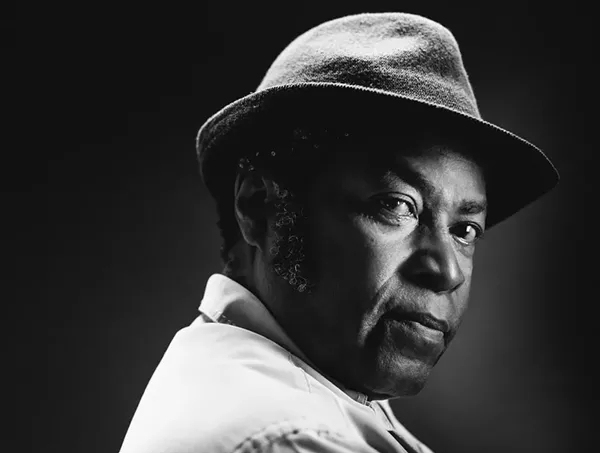Detroit has long been a pitstop or adopted home for many jazz musicians. For drummer, vocalist, composer, and poet Doug Hammond, it has been both. Born in Tampa, Florida, Hammond first moved here in 1965. He was one of the founding members of the Detroit Creative Musicians Association, serving as vice president and coordinator.
His work with that organization gave him the space to showcase the work of independent musicians, as well as produce concerts for his own groups, the most vital of which was a highly progressive quintet called Focus Novii. Other members included guitarist James "Blood" Ulmer, trombonist Patrick LaNier, bassist John Dana, and saxophonist William T. Wiggins. These productions went beyond music, incorporating poetry and dramatic dance into their artistic explorations.
Hammond then left the city in 1970 and headed to California to record the album Reflections in the Sea of Nurnen, which would become indelibly connected to Detroit despite not being recorded or really ever performed here, then split for the jazz mecca New York. In the '80s, he returned to Detroit but soon moved to Linz, Austria, where he worked as a professor at Bruckner University, teaching drums, composition, and ensemble. He retired in 2008 but has maintained residence both here and abroad ever since.
Hammond has traversed jazz from back to front and side to side, working in everything from blues and bop to soul jazz and avant-garde, with a healthy dose of classical training to boot. He has also performed with virtually every single Detroit jazz musician under the sun, as well as a whole host of national and international figures both established and up and coming. These include everyone from celebrated bassist and composer Charles Mingus and living legend tenor saxophonist Sonny Rollins to the many European players that appear on his most recent album.
That album is May Be Blue, a swingin' selection of compositions culled mainly from two live performances, one with a quartet and another with a trio. But Hammond is probably best known for two things: composing the song "Moves," a gingerly groovy tune most familiar from Mingus' version on Mingus Moves, where Hammond is joined by Honi Gordon for a vocal duet; and his own 1975 Tribe release Reflections in the Sea of Nurnen, which has become something of a Detroit jazz cult classic, thanks to revived interest in recent years from crate-diggers and the accessibility of reissues.
Reflections in the Sea of Nurnen found a perfect home on Tribe, with the collective's focus on Black independence, socio-political commentary, and sonic experimentation. Hammond shares a leader role with keyboardist David Durrah, each contributing three original compositions. The songs are a rhythmic mix of acoustic and electric, including some innovative Fender Rhodes and Moog from Durrah, with a stirring, soulful, honest message that flows and swings with singular beauty.
Hammond will perform as part of a string of three nights at Detroit's Trinosophes this week, with an all-star quartet of local musicians, including Dwight Adams on trumpet and flugelhorn, Marcus Elliot on tenor sax, and Rocco Popielarski on bass. The Doug Hammond Special will be performing music composed and recorded in Detroit, Paris, and all around the world, including "Dizzy Profile," a rare Charles Mingus composition that appears on May Be Blue.
Hammond spoke with Metro Times over the phone from his home in Austria, freely sharing his opinions (he doesn't like fusion, Freud, or war) and stories (like the one about Mingus you'll read below), peppering it all with deep laughter and philosophical asides.
Metro Times: What drew you to music?
Doug Hammond: My father and mother were ballroom dancers in Florida. They danced to the music of Duke Ellington, Count Basie, and Afro-Cuban music. When I was a small child, my father made me a three-piece suit and took me to the hall where I would see these bands and watch them dance. As I grew, I wanted to be a violin player because I liked the sound of the violin. In elementary school, it was an all-Black school [and they didn't] have violins, so my mother rented a trombone for me. For one year I did that. I thought that was a good instrument because it was closer to the human voice. In junior high, a band director asked me, "What do you want to play?" I said violin ... and he said, "[We have] a violin with a broken neck ... you should buy some drumsticks. We have drums." [Laughs.] So I said, "OK, I'll do this," and I fell in love with the drums.
MT: What do you love about the drums?
Hammond: I love everything about the drums. Without rhythm, you don't live. Rhythm is the basis of all of it.
MT: Can you tell me about being a part of Tribe?
Hammond: When I left Detroit in 1970, I went to California and recorded Reflections in the Sea of Nurnen. We recorded that in San Francisco with David Durrah and the other guys, some from Detroit. I had already composed "Moves" [while I was] in Detroit, so I composed two other pieces, "Wake Up Brothers" and "For Real," because my idea was to do something commercial [that was] also against the Vietnam War because I hate war.
I thought of it as a project [because I didn't] really want to play this kind of music on tour, but it needed to be made because this would be something that the guys can take and go on to [make] jobs for themselves. I was studying in Oakland at the time, but things got ridiculous in California because ... there was no work. So I got an NEA [National Endowment for the Arts] grant for composition and took that to New York.
In New York, a friend of mine had a [space] that was like a meeting place, and I did some seminars there with Reggie Workman and Charles Tolliver. This recording I had, I wanted to do with Strata-East, I had talked with [label founders] Stanley Cowell and Tolliver, but Strata-East was going through some internal things. So [Detroit trumpeter] Marcus Belgrave happened to be in town, he came by the place, and I was telling him about the record and he said, "Why don't you just put it on Tribe? You're part of the family!" So that's how that happened. I never played a live concert with this music, only "Moves."
MT: So you never play any of those songs live?
Hammond: Except "Moves." "Moves" has a history. "Moves" was originally called "Rita's Moves," for my girlfriend [at the time], Rita from Inkster. I was working with [Detroit harpist] Dorothy Ashby — I used to work with her, one of my best jobs was as her drummer. When I wrote "Moves," I did an arrangement of it, and I asked her if she would look at my arrangement and write some chords to it. She said my chords were OK but that she'd dress it up for me, so she helped me with that. And then I got married, years later in 1971, and I [showed] the lyrics to my wife, I said "What do you think about this? This tune is called 'Rita's Moves,' I wrote the lyrics. They're beautiful, but I can't call it 'Rita's Moves'." She said, "Why not? You loved the woman, didn't you?" I said, "That's nice. But why don't I just call it 'Moves'"? [Laughs]
MT: Can you tell us about Mingus?
Hammond: When I was living in the Village, we had this half-basement where we lived where we could play until [late] at night. [Mingus'] trumpet player needed a place to sleep, so the saxophone player who I was living with, he brought the trumpet player over one day ... He heard us, and he said, "Man, the way you write, you should have a job!" ... [Detroit drummer] Roy Brooks was in [Mingus' band at the time], but he was bipolar, so Mingus was having some problems. The trumpet player said, "I told Mingus about you, and he said that you can have the gig! So tomorrow I'm going to come over and go over a few songs." ... When we played the gig, I could read everything [because] we had the charts there, but I'd never seen the music of Mingus. But when we played, I played it all. After, Mingus took me around and said, "Nobody ever plays my music the first time! Would you consider working in my band?" So I swallowed a couple times and said, "Yes, sir." [Laughs] But the thing is, when I was in Florida, my teacher was from New York and he said, "If you want to play with somebody, learn their repertoire." Mingus didn't know I had learned everything I could that he ever recorded. I had learned the stuff. I thought it looked a little different, but I knew it already. So I never told him I had learned it, and he was just like, "Wow!" [Laughs]
Doug Hammond performs on Thursday, Nov. 7, Friday, Nov. 8, and Saturday, Nov. 9 at Trinosophes, 1464 Gratiot Ave, Detroit; 313-737-6606; trinosophes.com. Doors open at 8 p.m. each night. Tickets are $20 first two rows, $15 general admission.
Get our top picks for the best events in Detroit every Thursday morning. Sign up for our events newsletter.






